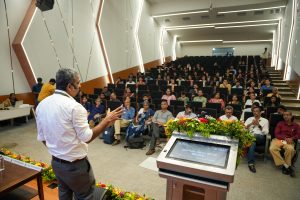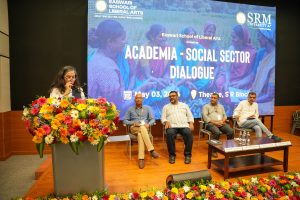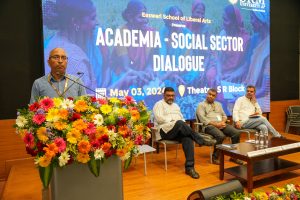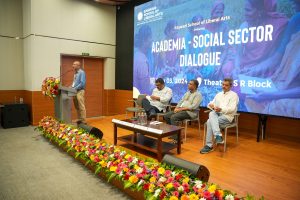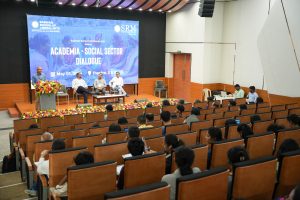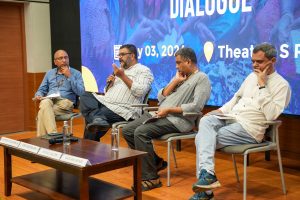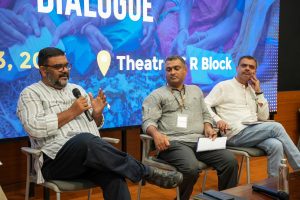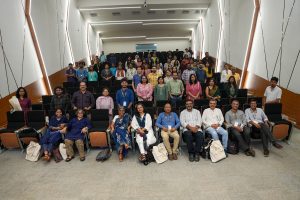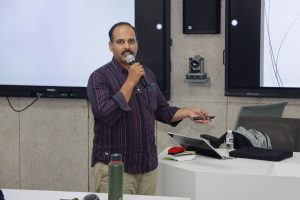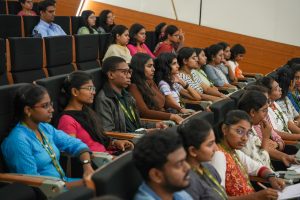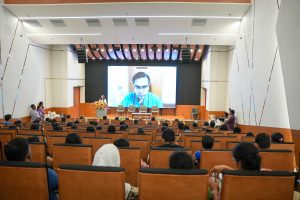News and Activities
- Tracing Feminist Discourse in the Intellectual Output of Women Trade Unionists in Late Colonial Bengal November 28, 2024
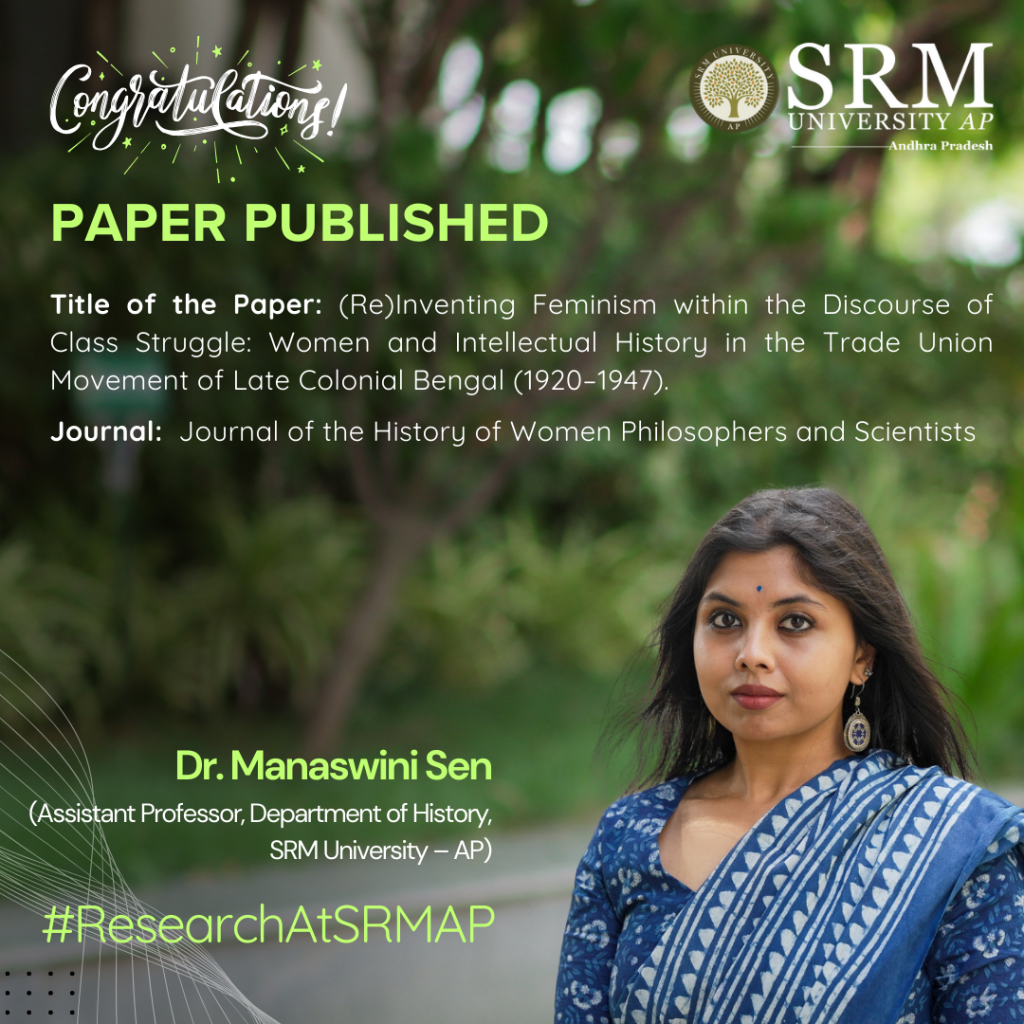
Dr Manaswini Sen, Assistant Professor at the Department of History, has published an insightful paper tracing the ideological and intellectual output of women trade unionists in late colonial Bengal. Her research paper titled “(Re)Inventing Feminism within the Discourse of Class Struggle: Women and Intellectual History in the Trade Union Movement of Late Colonial Bengal (1920–1947)”, published in the prestigious Journal of the History of Women Philosophers and Scientists, offers a novel perspective on understanding the class struggle, anticolonial discourse in the patriarchal society of colonial Bengal.
Abstract
This paper envisages (re)constructing the intellectual praxis of women trade unionists in late colonial Bengal. By arguing how political practice habitually translates to political thought, the paper devises a methodology to address the gendered discourse of intellectual history in the Global South. It focuses on intellectual output, primarily journal articles of women trade unionists like Santoshi Kumari Gupta, Maitreyee Bose, and Kanak Mukherjee, to trace a genealogy of how class struggle was perceived by women labour activists across the ideological spectrum of nationalism, socialism, and communism between 1920 to 1947 in Bengal. The piece is an effort to transcend the manifold marginalisations that plague the establishment of feminine political praxis within the regulating structures of colonialism and capitalism. In the process, it bids to unfold an alternative narrative of the anti-colonial, anti-capitalist, and anti-patriarchal narrative of the decolonisation of South Asian intellectual thought.
Research, Collaboration and Future Research Plans
The research strives to bring to the forefront the intellectual contributions of three female trade unionists in the late colonial period to trace the evolution of discourses on anticolonial class struggle from a gendered perspective. With the global turn in intellectual history, there is an augmented effort at amplifying the ‘small voices of history’. The inherent socio-cultural predicaments in our society make it inordinately challenging to trace conventional sources for mapping the intellectual endeavours of women. This paper aims to rectify this gap by reconstructing women labour activists’ intellectual practises and literary output in the early 20th century. In the process, the research tries to bring forth narratives of anticolonialism, which drowns in the overwhelming presence of nationalism in the discourses of decolonisation of South Asia. This paper was the result of academic exchanges with professors of Benaras Hindu University, Dr B.R. Ambedkar University, Delhi, and the University of Paderborn, Germany.
Dr Sen primarily researches marginal anticolonial epistemological traditions of South and South East Asia. Her thesis on the evolution and dissemination of socialism in late colonial Bengal, which focuses on an intellectual history of trade unionism, forms the basis of her first monograph. However, she is now focusing on the transnational and transcontinental intellectual networks of a wide spectrum of leftist labour activists and proto-nationalists and the ways these fringe intellectual traditions interacted with each other and nationalism. Based on a rich archive across India and Europe and a plethora of alternative sources, she tends to devise new methodological interventions in the field of Global Intellectual History, making labour history more accessible and relevant in scholarly circles.
Continue reading → - Easwari School of Liberal Arts Facilitates Transformative Academia-Social Sector Dialogue May 6, 2024
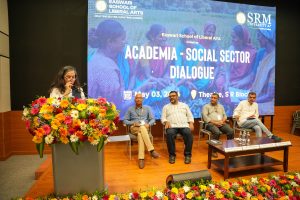 The Easwari School of Liberal Arts hosted the highly anticipated “Academia-Social Sector Dialogue” event, aiming to foster collaboration between academia and the social sector. The event brought together experts, social actors, scholars, practitioners, and students to engage in insightful discussions about the intersection of education and social sector development.
The Easwari School of Liberal Arts hosted the highly anticipated “Academia-Social Sector Dialogue” event, aiming to foster collaboration between academia and the social sector. The event brought together experts, social actors, scholars, practitioners, and students to engage in insightful discussions about the intersection of education and social sector development.The event, convened by Prof. Vandana Swami, brought together a distinguished array of social sector leaders, Academicians from various states across India, deans, faculties, and students. It was a day of enlightening discussions and knowledge exchange, aiming to bridge the gap between academia and the social sector.
At the heart of this dialogue was a commitment to nurturing well-rounded, socially conscious leaders of tomorrow. The event provided a platform for students to engage directly with eminent figures from the social sector, fostering a deeper understanding of real-world challenges and opportunities.
The dialogue saw participation from leading social actors, including Liby Johnson (Gram Vikas, Odisha), Ronak Shah (Seva Mandir, Udaipur), Nishant Aggarwal (Donyi Polo Cultural and Charitable Trust, Arunachal Pradesh), Swapna Sarangi (Foundation for Ecological Security, Odisha), Gayatri Menon (Independent Researcher, Public Health Foundation of India, Bengaluru and Academic luminaries, such as Suraj Jacob (Azim Premji University, Bengaluru) and Manu Mathai (World Resources Institute, Bengaluru) Yamini Aiyar, Former President, Center for Policy Research, New Delhi, added depth to the dialogue, offering nuanced perspectives on the intersection of academia and the social sector.
Prof. Vishnupad, Dean of Easwari School of Liberal Arts, expressed his satisfaction with the event’s outcomes, stating, “We are delighted to have facilitated this enriching exchange between academia and the social sector. The discussions were not only insightful but also generative, paving the way for potential future collaborations between students and social sector organisations that can bring about positive change in the society.”
A highlight of the event was the keynote speech by Amitabh Behar, Global Executive Director of OXFAM. Behar’s insights sparked discussions among attendees, leading to reflection and action-oriented dialogue on caste, gender, and economic inequality. This prompted introspection and dialogue on the responsibilities of civil society in addressing these urgent issues.
The event featured thought-provoking panel discussions on two key themes: “Social Sector and the Indian State: Challenges and Opportunities” and “Role of Social Sector in Liberal Arts Education.” Panellists deliberated on the complexities and possibilities within the social sector, exploring ways to address challenges and leverage opportunities for societal progress. The dialogue was not only engaging but also fruitful, laying the groundwork for potential collaborative efforts in the future.
Furthermore, discussions on the Easwari School of Liberal Arts Summer Immersion Programme underscored the institution’s commitment to experiential learning and social impact.
Prof. Vandana Swami, Professor, Easwari School of Liberal Arts remarked, “Academia-Social Sector Dialogue epitomises SRM University-AP’s ethos of excellence, innovation, and social responsibility. It serves as a testament to the university’s unwavering dedication to shaping future leaders who are not only academically proficient but also socially conscious and empathetic global citizens”.
Continue reading →


